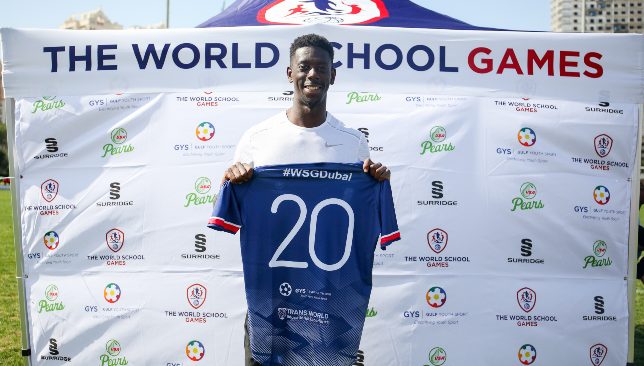
You don’t have to spend long in Reece Prescod’s company to know he is a young man brimming with ambition.
Building his way back to fitness after injury, the 6ft 3’ Londoner has completely changed his life in pursuit of achieving sporting glory.
From European silver medal success back in 2018 to a personal best time of 9.94 secs in Birmingham later that year, Prescod has all the tools to become a consistent force on the global stage.
The 23-year-old is the fourth-fastest GB sprinter of all time and would be many people’s tip to qualify for a 100m final if the Olympic Games were to happen tomorrow.
And with Tokyo just five months away, Prescod’s sole focus is getting his body back to prime condition again after injuring his hamstring at the Diamond League in Oslo last June.
“The priority is conditioning. As long as my body is in the right place, I can do what I need to do it. I tell my team ‘get me to the line, conditioned and I’ll take care of the rest’,” he told Sport360 at the World School Games in Dubai last week.
“That’s half the thing about athletics, you know you can do something but it’s whether your body lets you do it or not.
“I know what my body is capable of. It’s just getting back into that place. It’s just finding the training to get back into that place. With the hamstring, you need to condition it well. You can’t just go back to where you were before. Rebuild slow to fast.”
In truth, between all the fighting talk and his determination for success, the dream was nearly over before it started.
After three years of successive injuries, the Walthamstow native nearly jacked it in to become an estate agent. Back to a life where he wouldn’t have to deal with the heartbreak of rehabbing niggles and sore muscles.
“I like property and the thought of working my way up in things. A lot of my friends are doing it at the moment. They started selling off rentals and then moving up. It was something that I wanted to do,” he said.
“But luckily, I did one race at 20.7 secs and I got a Nike junior contract off the back of it. If I didn’t, I wouldn’t have continued. I was working three jobs at the time. I’ve always been a grafter. I’ve never been someone to sit at home.”
Prescod worked at a local Homebase, stacking shelves and offering DIY advice to customers.
He also worked as a barman at Woolston Manor Golf Course & Country Club in Chigwell until the early hours of the morning. Not ideal when he was due at the track for training at 9am most days.
In between jobs at Homebase and the golf club, he did some personal training for friends, balancing his training with hours in the gym to help fund his life.
It was only when Nike offered him a two-year junior contract that he could actually devote himself fully to running.

“It was then, from that point, I finished third at Olympic trials as a 20-year-old. That was probably my last 200m. I changed then to 100m and that was interesting. I ran my first 100m for the first time in two years in a time of 10.30 secs,” he said.
“Ten days later I ran again in 10.04 secs. Nearly sub-10 and that’s Olympic standard. Going into the 2017 World Championships, I made the final and raced against Usain Bolt. It was insane. It was the last race of his career.
“For me to start athletics and to get the opportunity to race against him before he retired is something that will always live with me.”
Making any comparison with Bolt is unfair on a young athlete who is still proving his mettle at the highest level.
A decade ago, Prescod’s tall and lean frame would have been deemed perfect for a 400m runner, but Bolt changed the template for the modern-day sprinter.
His tendency to start slow and finish fast is similar to Bolt. During the 2018 season, for example, the North London man changed his start five times. Little tweaks to allow him not to leak any valuable time.
It’s something that remains a work in progress for Prescod with a new and improved start helping him to become more productive at earlier stages of the race.
“My start was criticised and I’ve turned it into one of my strengths now. I’ve more focus on the start and I don’t really care about the end result as much anymore. Because I know if my start is right, then I’m in the race. If my start isn’t right, it will be a long day,” said Prescod.
“It’s technical. You can start with your head a bit more forward or a bit more up. You can start your arms wide or narrow. You can start really short and crunched up or with a lot of space. You can put your blocks in so many different positions so it’s about finding different styles. Ideally, you want the right projection angle in your block to send you forward.
“Some people can be up too high or too low. Coming out high is good because you’ve got a lot of space. But you may pop up too high and lose acceleration. Coming up too low you might fall flat on your face. However, if you can find that middle and the sweet spot, then you can shoot forward.
“We’ve got data and analysis where you can see that if I come out at the right angle I don’t leak any speed. I come out perfectly to run a faster time. When we do the measurements on the timing gaits, I could run 1.62/1.63 on average. If I fix my start I can go 1.50-1.55. Small change can change a whole timing.”
In 2018, just a few months after finishing seventh in Bolt’s farewell race in London, Prescod won silver at the European Championships in Berlin, sealed his first Diamond League victory in Shanghai and ducked under 10 seconds on four occasions.
He would also set a new personal best time of 9.94 secs in Birmingham, putting him in the world’s top 10 sprinters of that year.
Last season, he started in promising fashion with a personal best of 6.53 secs over 60m in Berlin and Birmingham. In the 100m, he clocked 9.97 secs in Shanghai to place fourth.
Signs of progress were showing until he injured his hamstring while contesting the 100m in Oslo and he’s not raced since.
The injury would see him miss out on the World Championships in Qatar where he was rated as having an outside shot at a medal.
Months have passed since his injury and the hamstring is firing again. He is stepping up his training with Tokyo dreams in mind. The pinnacle of any athlete’s career.
Talk of the Olympics will always fall his way with the year that’s in it. He could make it to the start line in sparkling form, but it all depends on how the body reacts over the next few months. He needs to finish in the top two at the British Championships on June 20.
“I’ve done 600s, 500s and now I’m at a 400 stage. I want to bring it down slowly. I’ve got to keep running, long and then get faster and faster week by week,” he said.
“I have to get my body used to moving again. The more miles I can get in my legs, the greater. If your fit, and you’ve got your power and strength, then you’ll run fast. I’m feeling pretty decent now to be fair.”
Britain has had four men’s 100m Olympic champions over the years – Reggie Walker (1908), Harold Abrahams (1924), Allan Wells (1980) and Linford Christie (1992).
Christie, who retired from international competition in 1997, remains the quickest man to wear GB colours. His record of 9.87 secs from Stuttgart in 1993 is the benchmark and has yet to be threatened.
Prescod has a 9.94 secs personal best (9.88 wind assisted) and breaking Christie’s 27-year record is a key career target before he hangs up his spikes.
“Before I finish, definitely. As long as the body stays good. It should be all good. I’m getting there,” said Prescod.
“(In terms of general goals) I make a list: am I eating alright, sleeping alright, drinking enough water, good therapy, training, strength, power, endurance, core balance. I make a list and I’ll review that list every couple of weeks. You’ve always got to be planning and ready to go.”
Reece Prescod was in Dubai as guest of honour at the U11 World School Games. The World School Games is a series of international sports events with the quest to unearth the World Champions of school sport. Over 2750 students representing 85 schools from 26 countries entered a WSG series event in 2019 and more than 150 schools from 40 countries have registered for 2020
